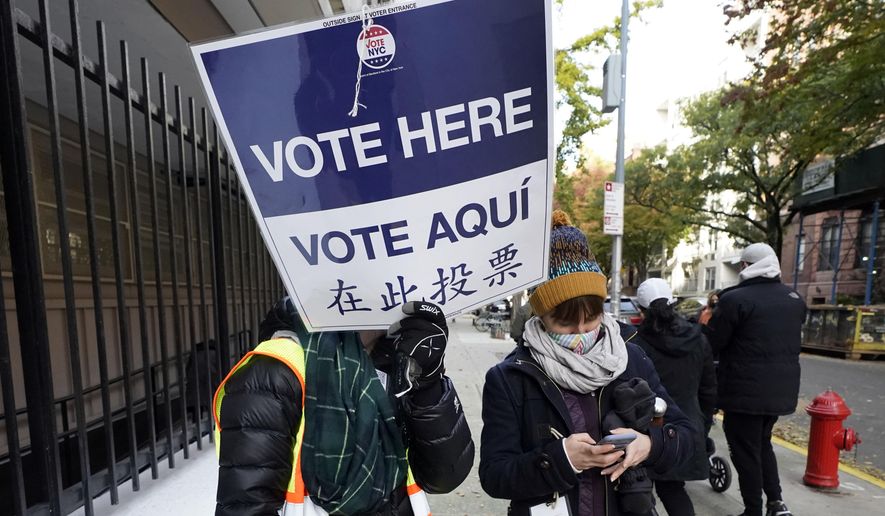NEW YORK — New York City can’t let noncitizens vote for mayor and other city officials, a judge ruled Monday, siding with Republicans who challenged the measure as unconstitutional.
In January, New York became the first major U.S. city to grant widespread municipal voting rights to noncitizens, though none had cast ballots yet. The law didn’t affect presidential, congressional or state elections.
The law’s supporters said it gave an electoral voice to many people who have made a home in the city and pay taxes to it but face tough paths to citizenship. New York GOP Chair Nick Langworthy and several Republican elected officials said the law violated provisions in the state constitution and state election law that specifically confer voting rights on citizens.
State court Judge Ralph Porzio agreed with the GOP.
“Though voting is a right that so many citizens take for granted, the City of New York cannot ‘obviate’ the restrictions imposed by the Constitution,” wrote Porzio, whose court is on Staten Island. His ruling blocks the city from registering potentially more than 800,000 new voters without U.S. citizenship.
Langworthy hailed the ruling as a “victory for citizen rights, election integrity and the rule of law.”
He and other plaintiffs accused the Democrat-led city government of passing the law for partisan gain.
“As the son of immigrants that came to this country legally and worked tirelessly to become citizens, I consider voting to be a sacred right bestowed on American citizens,” added state Assembly Member Michael Tannousis, whose parents were originally Greek nationals. He represents parts of Staten Island and Brooklyn.
The city said it was considering next steps.
“This is a disappointing court ruling for people who value bringing in thousands more New Yorkers into the democratic process,” the city Law Department said in a statement.
The agency had argued that the state Constitution leaves room for the city to make rules about its own elections, and that the law would help ensure that local officials are representative of the population.
Legally documented, voting-age noncitizens comprise nearly one in nine of New York City’s 7 million voting-age inhabitants.
More than a dozen communities across the United States allow noncitizens to cast ballots in local elections, including 11 towns in Maryland and two in Vermont. In San Francisco, noncitizens can vote in school board races; New York City allowed the same for three decades, until its school board was disbanded in 2002.
Meanwhile, Alabama, Colorado and Florida have in recent years adopted rules that would preempt any attempts to pass laws like the one in New York City. Arizona and North Dakota already had prohibitions on the books.
In New York City, a proposal to let noncitizens vote in city elections was floated for years before passing the Democrat-led City Council in December. One council member, Francisco Moya, choked up as he envisioned his mother, an immigrant from Ecuador, becoming able to vote for him.
The law gave municipal voting rights to noncitizens who have been lawful permanent residents of the city for at least 30 days, as well as to those authorized to work in the U.S. - including “Dreamers,” a term for young immigrants living in the country illegally who were brought here as children and have temporary protection from deportation. The term is based on the DREAM Act, a never-passed congressional proposal that involved them.
Then-Mayor Bill de Blasio had reservations about the city law, including questions about its legality, and took no action on it. Successor Eric Adams then let the measure become law without his signature. Both Adams and de Blasio are Democrats.




Please read our comment policy before commenting.